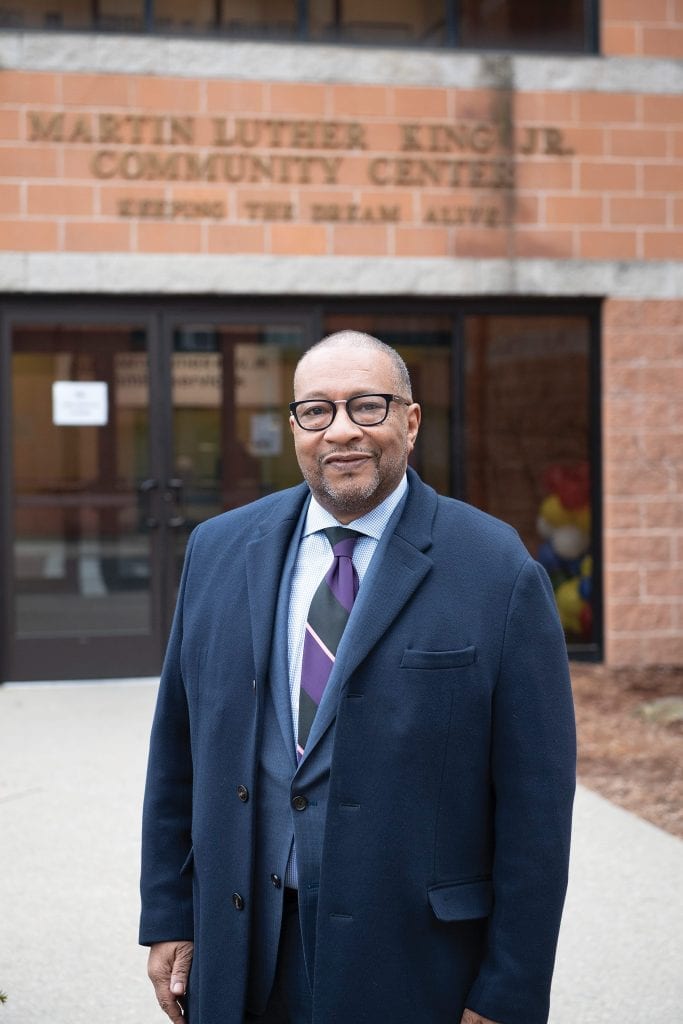Ronn Johnson
Meeting Community Needs Has Become Even More Critical During a Difficult Year

Ronn Johnson has spent a lifetime improving the neighborhood of his youth — and impacting lives far beyond it.
(Photo by Leah Martin Photography)
When times got tougher for struggling families back in March, they appreciated any resources they could access, from emergency food supplies to educational assistance to … lotion?
“With children being home every day, parents were super stressed, and they needed a way to manage it all,” said Ronn Johnson, president and CEO of Martin Luther King Jr. Family Services Inc. in Springfield.
“We said, ‘let’s deliver pampering products to these women — lotions, bath oils, shower gels, facial scrubs — things they can use to pamper themselves with on occasion, once the children are down,” he told BusinessWest earlier this month. “With the response we got, it was like we’d given them a pot of gold — they said, ‘these are things I’ve never been able to get for myself.’”
Those items were complemented by deliveries of hard-to-find cleaning supplies and paper products. But they certainly didn’t replace the bread-and-butter services of the organization, from educational resources to healthy-food access.
The pandemic, in fact, only laid bare a growing need for such services — and new ways of delivering them.
“It was a tremendous challenge to pivot on a dime. We’ve had to restructure ourselves from being an after-school resource to being a remote-learning center,” Johnson said, noting that the organization serves many economically disadvantaged families that need extracurricular support and don’t want to have to choose between their kids and making a living. “Work is important to them, but their child’s education is also important. We’re one of the resources in the community trying to be responsive to the needs of children.”
The center has also expanded its emergency-food program, serving up to 400 people weekly. Even so, pantry volunteers weren’t seeing some of the faces they expected to see — mainly older people — and learned these regulars were staying at home because of fears for their health.
So Johnson talked to community partners, in particular Baystate Health, which helped procure a cargo van to deliver food to homes. The volunteer-driven delivery program began with about 10 recipients and now visits some 65 elderly, sick, and shut-in individuals every week.
Johnson’s work with MLK Family Services — the latest stop in a career dedicated to his community — is one reason he was chosen as a Difference Maker, along with his work with the Brianna Fund, named for his daughter, which has raised more than $750,000 over 22 years and helped 50 children with physical limitations access tools to improve their lives.
But he stresses that he can’t do his job alone. To serve 750 different people each week with after-school programs, college courses, family support, public-health outreach, sports programs, cultural activities, and more — with only about $1.6 million in annual funding — he relies not only on his team, but more than 100 volunteers.
They worked together to open summer camp this year, he noted. “That was well-thought-out; we assured we had all the safe distancing and PPE, and we made it work, with no incidents of the virus spreading. It was a real benefit to both children and their parents, to provide meaningful activities for them eight hours a day.”
Community members stepped up this spring and summer in other ways as well. For example, a woman came by in late March to donate a new laptop to the center, along with funds to distribute items like coloring books, flash cards, notebooks, crayons, and markers so kids could occupy themselves when holing up at home became the new normal.
Johnson also credited the Community Foundation of Western Massachusetts for its financial support of the center, as well as donations that came in after Common Wealth Murals and Art for the Soul Gallery drew attention to the center in June with a mural, called “Say Their Names,” honoring individuals killed by police violence.
He’s equally gratified that people are talking.
“It’s been heartwarming and affirming that our white neighbors and other community members have extended their support to us, not only financially, but they’re looking to be engaged in conversations,” he said. “So many families from the suburbs and the hilltowns came to Mason Square to show their children this mural.”
It’s a conversation being held back on the national level by leaders who refuse to engage in these issues and create positive momentum, he added. Yet, he’s encouraged by young people of all races who are energized by fighting for social justice.
“That is very encouraging,” he said. “We need to build bridges to understanding and have it happen in a more global way than just these pockets of support.”
In the meantime, he’ll keep building bridges locally, and making a difference for families whose needs go much deeper than lotion.
But a little pampering never hurt.
—Joseph Bednar






